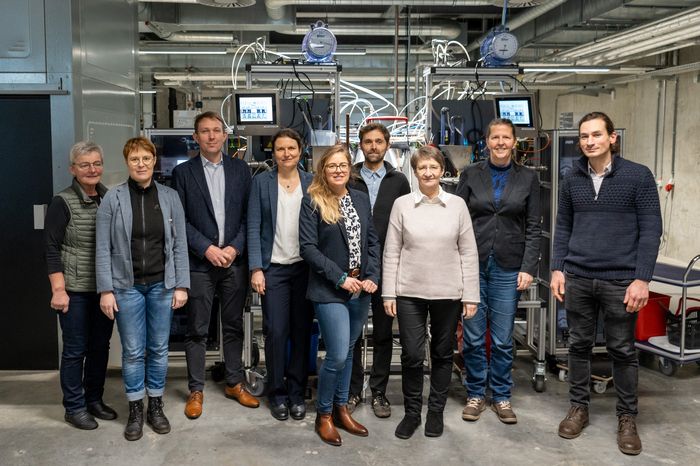How can chemicals for the bioeconomy be produced on a large scale from regional residues? This question is being investigated by a team of researchers from the Deutsches Biomasseforschungszentrum (DBFZ) and the Helmholtz Centre for Environmental Research (UFZ) together with industrial partners in the new “CapUp” project. The aim of the project is to scale up their process developed previously at a multi-purpose demonstration plant for recovering caproic and caprylic acid for the chemical industry. The project is funded by the German Federal Ministry for Economic Affairs and Climate Action (BMWK).
Medium-chain carboxylic acids such as caproic and caprylic acid are high-value specialty chemicals with applications in the lubricants, in pharmaceuticals, cosmetics, feed, and food sectors. Currently, these compounds are extracted from palm kernel or coconut oils, in which they are present in low concentrations. A more environmentally friendly alternative is their production from regional agro-industrial waste and residues using natural microbiomes.
The process – in which complex substrates can be converted to chemicals without pre-treatment steps – is based on anaerobic fermentation and was developed jointly by DBFZ and UFZ. The fermentation is followed by a separation and purification cascade to recover the medium-chain carboxylic acids from the fermentation broth. These acids can then be further processed into different chemicals (e.g., esters), depending on the scope of application.
In the “CapUp” project (funded by the BMWK programme Industrial Bioeconomy and coordinated by the VDI Technologiezentrum GmbH), the entire process chain is being demonstrated at a Technology Readiness Level (TRL) of 5-6 at the DBFZ’s multi-purpose demonstration plant and the produced bio-based chemicals will be examined in extensive product tests. In addition to DBFZ and UFZ, the industrial partners involved in the research project are GNS – Gesellschaft für Nachhaltige Stoffnutzung mbH (coordinator), BALANCE Erneuerbare Energien GmbH, VNG AG, FUCHS Lubricants Germany GmbH, and Kelterei Sachsenobst GmbH. The process used in CapUp gives biogas plant operators the possibility of including value-added chemicals into their product spectrum, opening new business opportunities on the way.
The underlying process for the production of the carboxylic acids from regional biomass is based on the project “Bio-based caproic and caprylic acid – production, purification, marketingstrategy – CapAcidy” (FKZ: 031B0389) funded by the Federal Ministry of Education and Research (BMBF). The scientists Maria Braune (DBFZ) and Dr. Heike Sträuber (UFZ) have been awarded the German Biogas Innovation Prize of the German Agriculture in 2019 for their development of the process.
Smart Bioenergy – innovations for a sustainable future
The DBFZ works as a central and independent thinker in the field of energy and material use of biomass on the question of how the limited available biomass resources can contribute to the existing and future energy system with sustainability and high efficiency. As part of the research the DBFZ identifies, develops, accompanies, evaluates and demonstrates the most promising fields of application for bioenergy and the especially positively outstanding examples together with partners from research, industry and public. With the scientific work of the DBFZ, the knowledge of the possibilities and limitations of energy and integrated material use of renewable raw materials in a biobased economy as a whole should be expanded and the outstanding position of the industrial location Germany in this sector permanently secured.
Source
DBFZ, press release, 2023-02-07.
Supplier
Bundesministerium für Bildung und Forschung (BMBF)
Bundesministerium für Wirtschaft und Klimaschutz (BMWK)
Deutsches Biomasseforschungszentrum GmbH (DBFZ)
Fuchs Petrolub AG
Gesellschaft für Nachhaltige Stoffnutzung mbH (GNS)
Helmholtz-Zentrum für Umweltforschung (UFZ)
VNG Gasspeicher
Share
Renewable Carbon News – Daily Newsletter
Subscribe to our daily email newsletter – the world's leading newsletter on renewable materials and chemicals










